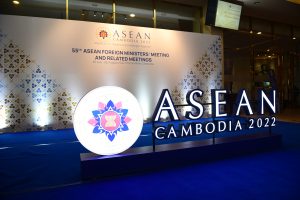This morning, the foreign ministers of the Association of Southeast Asian Nations (ASEAN) released their annual joint communique, in which the bloc’s 10 member states offer their annual status update and lay out their official position on issues of regional and global import.
Requiring consent from all 10 ASEAN member states, the negotiation of the communique is typically a protracted process, particularly in the case of sensitive issues such as disputes in the South China Sea. Indeed, during Cambodia’s last ASEAN chairmanship in 2012, a deadlock over the paragraphs on the maritime disputes temporarily prevented the release of the communique for the first time in ASEAN’s history.
Like most years, the bulk of this year’s communique is made up of regional institutional boilerplate about connectivity, social and cultural exchanges, and economic initiatives of various kinds. The section headed “Regional and International Issues” (paragraphs 114-118) provided the bulk of the material of interest, laying out the bloc’s consensus position on the crisis in Myanmar, and two major international flashpoints: the South China Sea disputes and the Russia-Ukraine war.
A good deal of anticipation has surrounded the question of how the bloc would handle the deteriorating situation in Myanmar. This week’s ASEAN meetings were preceded by the junta’s execution of four political prisoners, a cruel and escalatory act that shocked ASEAN member states and has prompted calls for the organization to toughen its stance against the military junta.
In an ASEAN Chairman’s statement last week, Cambodia described the killings as “highly reprehensible” and said that they signified the military administration’s “gross lack of will” to implement the bloc’s Five-Point Consensus peace plan, which calls for an immediate cessation of violence and peaceful negotiations. The executions also prompted Malaysia’s Foreign Minister Saifuddin Abdullah to suggest that the bloc might have to think of abandoning the Five-Point Consensus altogether.
Little of this anger found its expression in the final communique. The foreign ministers noted that they “expressed [their] concerns over the prolonged political crisis in the country,” including the execution of the four political activists last month. The paragraph added that ASEAN is “deeply disappointed by the limited progress in and lack of commitment of the Nay Pyi Taw authorities to the timely and complete implementation of the Five-Point Consensus.”
The softer language is not a surprise. As Aaron Connelly of the London-based International Institute for Strategic Studies noted in a Twitter thread today, while the military junta has been excluded from high-level ASEAN conclaves, including this week’s Foreign Ministers’ Meeting, “the junta took part in negotiations on the text, including the paragraph on Myanmar.”
Connelly wrote that officials from Singapore, Indonesia, and Malaysia had “pushed for tougher language in the Myanmar paragraph, including denouncing the executions and specifically naming Aung San Suu Kyi and Win Myint” – the de facto and titular heads of the civilian government overthrown by the military last February – “but with the junta still at the table no consensus on these elements could be achieved.”
The one sting in the tail, at least from the junta’s perspective, was the communique’s recommendation that the junta’s implementation of the Consensus be reviewed at the ASEAN Summit in November, in order “to guide the decision on the next steps.” It said this should be conducted “consistent with Article 20 of the ASEAN Charter,” which states that “non-compliance” or a “serious breach” of the Charter can be referred to the ASEAN Summit for a response. While ASEAN has effectively kicked the can three months down the road, this statement holds out the possibility of the remaining nine members imposing additional bespoke restrictions on Myanmar – if it can get beyond Myanmar’s veto.
In its two paragraphs on the disputes in the South China Sea, which pit China against four ASEAN member states, Cambodia seems to have sidestepped a repeat of the controversy of 2012. It quite adroitly shepherded through two paragraphs that bear a close resemblance to those of last year’s communique, with some ministers registering “concerns” about “land reclamations, activities, [and] serious incidents in the area” by unnamed countries (as usual, China is not explicitly mentioned) that “have eroded trust and confidence, increased tensions, and may undermine peace, security, and stability in the region.”
Echoing last year’s communique, it also reaffirmed “the importance of maintaining and promoting peace, security, stability, and freedom of navigation” in the South China Sea, and “the importance of upholding international law” in the resolution of the disputes.
Finally, the communique weighed in on the ongoing war in Ukraine. Most Southeast Asian nations have chosen to remain neutral on the Russia-Ukraine war, and none aside from Singapore has opted to join the international campaign of sanctions against Moscow. As such it was no surprise to see the first half of the final communique hewing quite closely to the statements made by individual states in the aftermath of the February 24 invasion, most of which condemned the act without naming the actor.
In the communique, the foreign ministers reaffirmed their “respect for sovereignty, political independence, and territorial integrity,” and repeated earlier calls for “compliance with international law and the United Nations Charter.” It went slightly further in calling for an “immediate cessation of hostilities” and for “the facilitation of rapid, safe, and unhindered access to humanitarian assistance for those in need,” but otherwise maintained ASEAN’s middle-way position on the ongoing war in Europe, again without mentioning Russia by name.

































